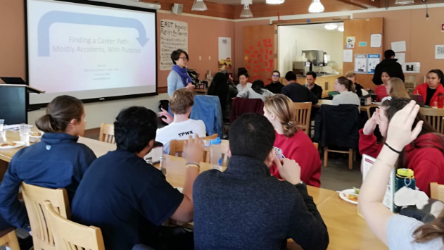My Road to Teaching
In college and during graduate school at Stanford University, I studied International Relations and Political Economy of Development.
I focused on understanding why rich countries are rich and poor countries are poor. I was especially interested in learning about the People's Republic of China as it was undergoing dramatic changes.
What I most remember from my academic studies at Stanford was an approach to understanding the world that emphasized history and thinking in terms of systems. This means, I came to appreciate two key perspectives:
- The present is always partially determined by the past, and
- A social phenomenon is likely part of a larger system that creates the conditions for that phenomenon.
While I may have long forgotten the details of what I learned during my college days, these two perspectives have stuck with me.
Work as Experimentation and Self-Discovery
After Stanford, I moved to Boston. Instead of applying my degrees toward a job directly related to my academic field, I chose to enter the non-profit world of youth leadership development. In Boston, I worked for an AmeriCorps program, called City Year. I organized community service projects, designed leadership development curriculum, and facilitated staff training.
It was during this time that I learned something important about myself. I discovered what I enjoyed doing and had some talent in....I like creating experiences of learning.
Lesson Learned: My first job out of college did not match up directly with what I had studied, but it turned out to be an invaluable time of self-discovery. I got my first glimpse at what I like doing and what I have a knack for.
I worked for a few more years after that. I moved back to California to help establish a City Year office in San Jose. There, I designed and managed a year-long curriculum of service-based learning for young people who dedicated a year of their lives to community service. Later on, I worked at the Presidio Leadership Center and found myself facilitating workshops on organizational learning and teaching curriculum on organizational leadership.
All of this work experience helped me confirm what I got a glimpse of earlier: I do love creating experiences of learning. But I was also able to refine what I knew about myself: I like creating COLLECTIVE experiences of learning and opportunities for SELF-KNOWLEDGE.
While I was working, I was also reading, a lot. I was reading bell hooks (like Talking Back, Killing Rage, Teaching to Transgress, and my fave, Breaking Bread), Cornell West (Race Matters), and Asian American anthologies. And through this, I made another self-discovery: I really like intellectual work--thinking about how we know what we know, and talking with others to deconstruct what we think we know, especially when it comes to the dynamics of race in the U.S.
Looking back, I treasure my work experiences in the years after college because they gave me the opportunity to try out new things, see what I like, and reveal what I was good at.
Back to (Graduate) School
Not surprising, by then, I had a feeling that I wanted to teach college. This led me back to school. I went to UC Santa Cruz and the department of cultural anthropology was a perfect fit for me. The program there emphasized engaging with knowledge in order to denaturalize the taken-for-granted and to re-center the marginal. This was exciting. I was being trained as a cultural anthropologist who pays special attention to social relations of power in the process of making sense of all kinds of "culture." I loved every minute of being a student again.
While I was in the Ph.D. program at UCSC, De Anza was looking for someone to teach in the Intercultural Studies department. A friend who was an instructor at De Anza told me about the opening, and soon after, I began teaching my first classes at De Anza--in Asian American Studies.
Since 2001, I have been teaching Asian American Studies and classes on understanding race and ethnicity in the U.S. from a comparative perspective. Notably, my classes incorporate the two key perspectives I took away from college and my training as a cultural anthropologist. All of the courses I teach make the point that present-day conditions of race in the U.S. cannot be understood outside of historical context. And, any particular phenomenon of race in the U.S. does not make much sense unless understood within the larger social conditions of race and power in the U.S.
After all these years, I still love teaching my classes at De Anza. I find that these classes are a unique forum to think deeply about our personal experiences and life observations of race and power. The classes also offer a safe AND challenging environment for us to engage with important matters about race and inequality in the U.S.
So Glad You're Here
I look forward to meeting you and sharing in the learning process together. I'm so glad you're here, whether you're considering De Anza or already enrolled in one of my classes.
Encouraging Stanford undergrad and graduate students to consider teaching at a community college, EAST House, 2020.


